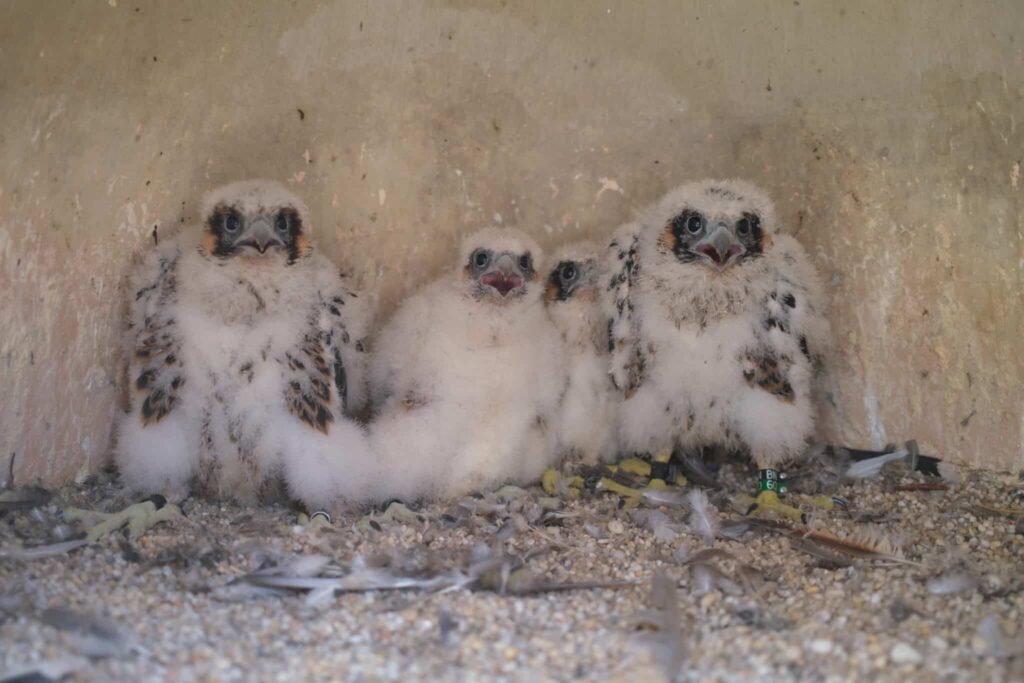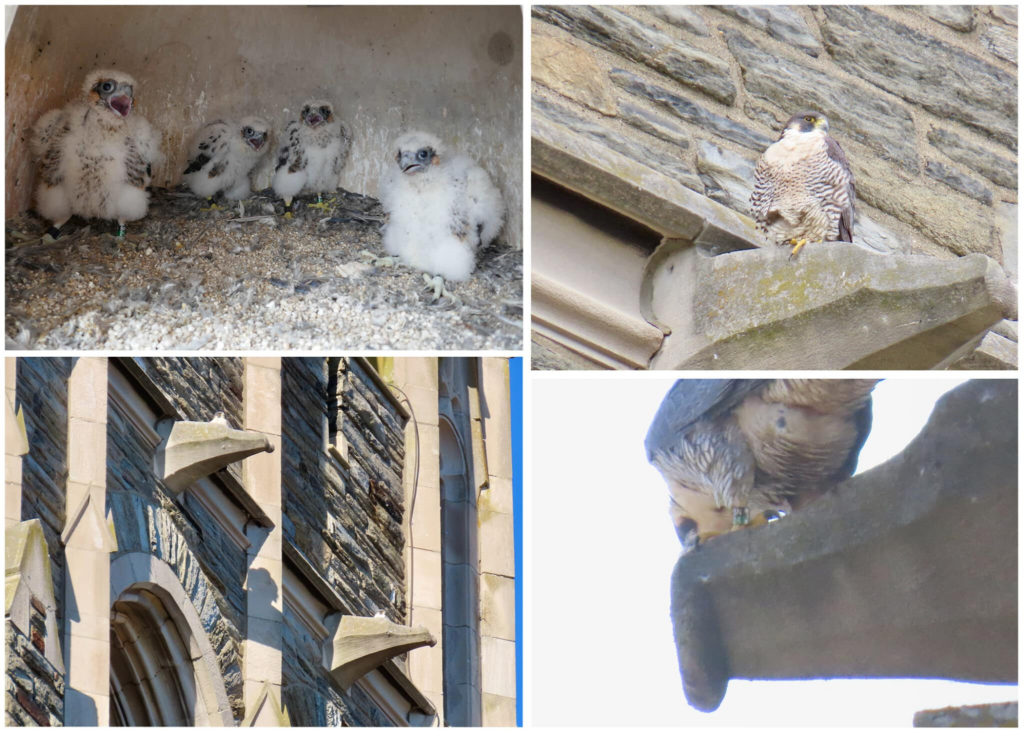


It’s been a while since the last update. Since then all young have fledged. Thank you to Kathy Clark with NJDEP for the timeline of events that followed:
There were few sightings of Frida and Mango after the young fledged.

A week later, a new *banded* female was observed by viewers. She has been observed courting with Mango. This is clearly the reason why we haven’t seen the fledglings or Frida. We have not received any reports of them being found nearby. As Kathy stated in an email, “this isn’t a good sequence of events for the fledglings.” At this point it is unclear where they have gone and if they are still alive. Since they were banded, they can be traced back to this eyrie. We can only hope that they are alive and well. As we stated in a previous post, this urban nest being productive is really crucial to maintaining the falcon population in New Jersey with coastal nests being abandoned.

About this new female. Since she is banded, we know more about her. She only has a federal band but with the camera, Kathy was able to read the band – 1947-31215. Kathy reported that “she hatched in 2016 (unknown where) and was captured at JFK Airport and transported/banded in New Paltz, NY, where she was released (8/18/16).” She has been courting with Mango since June 21.
It is only a matter of days until we see BK/10 fledge, followed by his siblings. This is a critical time for them and the most dangerous as they gain flight skills. We are thankful that Union County staff who work at the Courthouse keep an eye out for any fledglings that might end up on the ground below the building!

We Have Lift Off! Peregrine Falcon chicks are learning to fly on top of the Union County Courthouse
BN60, one of Union County’s newest female falcon chicks, is learning to fly and hunt her prey. All four of the falcon chicks are all easily making their way around the roof and onto railings to perch, which is called branching.
This is an important time for them to hone their flight skills, especially landing and taking off. Males can fledge as early as six weeks old.
This clutch, or group, of falcons contains three females and one male. Once the falcon chicks do fledge, the adults will continue to provide food for them. Sometimes, they will transfer prey mid-air, which will also help the young develop hunting skills that they will use for the rest of their lives.

On May 19th all four of the eyases (young falcons) were banded for future tracking. There are three females and one male this year. The youngest is female, which was a good thing as it needed that extra size to compete with its siblings for food. Their bands are: BN/60, BN/61, BN/62 and the male is BK/10. You can read more about the banding of these young falcons here.
Now they’re all right around 5 weeks old and loosing their fluffy white down feathers very quickly. They are old enough to want to explore a bit more, as every day they leave their nest and explore the rooftop. This makes it much harder for us to track them with the camera.
Their first flights are not too far away. The male will fledge first. Usually they fledge at around 6-7 weeks and females at around 7-8 weeks. That means the male will be taking his first flight later next week and his oldest siblings the week after. This is a crucial time for them where life gets much more dangerous. As soon as they leave the protection of their nest then they can get into trouble. Navigating our human dominated landscape is not easy. There is a lot of infrastructure for them to navigate around. Buildings with lots of glass or mirror facades can trick their perception of the landscape, especially when they’re starting to pursue prey. But first, they need to practice those essential flight skills of mastering takeoff and landing. Either way, it is a joyous time to watch them grow!

The eyases (young falcons) are now three weeks old and their flight feathers have emerged from pin. At this age they are looking (and exploring) beyond their nest. Their eyesight has improved dramatically as they watch their parents fly above their nest and planes in the sky. They are venturing outside of their nest, as it gets more cramped and warm, especially on sunny days.
Thankfully, we have observed no signs of trichomoniasis and this is the first year in a long time (maybe forever?) that they were not treated preventative medicine. There has also been no signs of infestations of a wingless parasitic fly on the eyases that has affected coastal falcon nests. The wingless flies feed on blood in their underwing area. It is evident when we see a lot of dirt (fecal matter) and feather loss in that area of their bodies. Another really good sign that these young are all in good health. Even the little guy isn’t looking so little anymore.

Banding is still scheduled for the morning on Monday, May 19. We’ll be sure to update everyone on social media about the banding event that day.

The youngest peregrine falcon nestling, who hatched on April 28, is now one week old, while its three older siblings are approaching two weeks. With each passing day, these young falcons—called eyases—are growing stronger and more alert under the watchful care of Frida and Mango.
At this stage, they are still covered in fluffy white down and rely entirely on their parents for warmth and food. They are often observed sleeping but also preening their downy feathers. Their eyesight is improving and they are starting to look around as they explore their nestbox. Feeding time is frequent, with the adults carefully tearing food into small, manageable pieces of prey. We’ve seen them bring in a variety of prey, mostly songbirds, including mourning doves, blue jays and homing pigeons. The larger the young get, the more prey they need, as they tend to eat around half their body weight each day.
Looking ahead, biologists are planning to visit the nest on May 19 to carefully band the eyases. Each band placed on a peregrine falcon chick has a unique combination of letters and numbers, kind of like a falcon’s license plate! These bands allow biologists to identify individual birds years later—sometimes from hundreds or even thousands of miles away—just by spotting them and reading the code on their band.
On the morning of April 28th viewers noted the presence of a fourth hatching! This is right on schedule for when it was laid, which was five days later than egg #3 and same time period after other eggs hatched. What a happy surprise, as I’m sure most of us were thinking that if the fourth didn’t hatch soon then it wouldn’t. We’ve seen how quick parental care shifts from incubation to brooding and feeding young. In a few days the oldest nestlings will be a week old. The adults will continue to brood them as they are not quite able to regulate their body temperatures. During the day, the adults will start to leave them unattended for short periods when temperatures are at their warmest. We are keeping an eye on them for signs of trichomoniasis, which is a pigeon borne disease that can be fatal to young PEFA if not treated.
Incubation continues with a little housekeeping. As of April 9, we are at day 20 of incubation, which began after the third egg was laid. The fourth was laid five days later. Falcons typically incubate for around 30 days, so we should start to see signs of hatching late next week. Once eggs begin to hatch, attention of adults will be directed towards their young with less going to the fourth egg. We shall see if it does hatch.

This week Kathy Clark, Chief/NJDEP Fish & Wildlife/ENSP received a report of BN/24, a female that was banded at the Union County Courthouse in 2023. She is now frequenting a tall building at Saint Joseph’s University in Philadelphia. She has been observed with a banded male falcon (BH/40), that fledged from a nest atop the NJ side of the Walt Whitman Bridge in 2022.
Students and staff have noted the presence of the falcons since fall 2024 and even wrote about them in the school paper. They have been seen perching, feeding and mating on Barbelin Hall. It looks like the site could be a great location for them to nest. Add an igloo atop the roof, add some gravel and you have a new falcon nest site.
Karl Platzer reports that BN/24 has been observed daily since Fall 2024, usually perched on the Barbelin Hall bell tower at Saint Joseph’s University Philadelphia campus (AKA Hawk Hill).
In other news, the pair continues to incubate the four eggs. In another two weeks we will be watching for hatching.